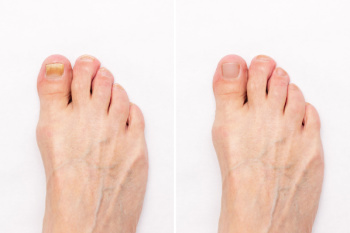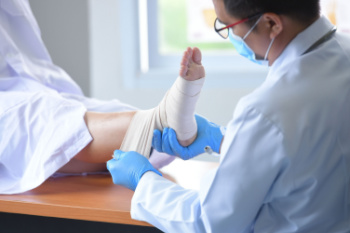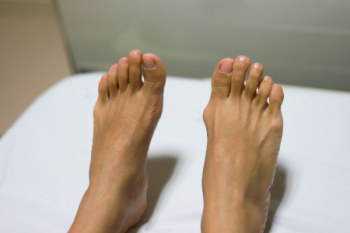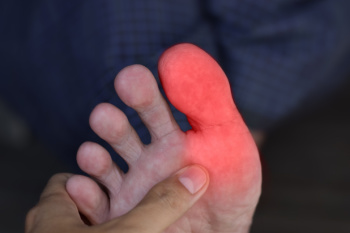Connect With Us
Blog
Items filtered by date: October 2024
Toenail Fungus Progression and Treatment

Toenail fungus, or onychomycosis, begins as a small white or yellow spot under the nail. As the fungus spreads, the nail can thicken, become discolored, and develop a brittle or crumbly texture. Without treatment, the fungus can worsen, leading to overgrowth, making it difficult to trim nails, and causing discomfort when walking. In severe cases, the nail may separate from the nail bed, increasing the risk of bacterial infection. Signs that toenail fungus is getting worse include increased nail thickening, spreading discoloration, foul odor, and pain. If left untreated, the infection can spread to surrounding skin, causing more severe issues like cellulitis. If you have signs of toenail fungus, it is suggested that you schedule an appointment with a podiatrist for a proper diagnosis and treatment.
If left untreated, toenail fungus may spread to other toenails, skin, or even fingernails. If you suspect you have toenail fungus it is important to seek treatment right away. For more information about treatment, contact one of our podiatrists of Tri-Town Podiatry. Our doctors can provide the care you need to keep you pain-free and on your feet.
Symptoms
- Warped or oddly shaped nails
- Yellowish nails
- Loose/separated nail
- Buildup of bits and pieces of nail fragments under the nail
- Brittle, broken, thickened nail
Treatment
If self-care strategies and over-the-counter medications does not help your fungus, your podiatrist may give you a prescription drug instead. Even if you find relief from your toenail fungus symptoms, you may experience a repeat infection in the future.
Prevention
In order to prevent getting toenail fungus in the future, you should always make sure to wash your feet with soap and water. After washing, it is important to dry your feet thoroughly especially in between the toes. When trimming your toenails, be sure to trim straight across instead of in a rounded shape. It is crucial not to cover up discolored nails with nail polish because that will prevent your nail from being able to “breathe”.
In some cases, surgical procedure may be needed to remove the toenail fungus. Consult with your podiatrist about the best treatment options for your case of toenail fungus.
If you have any questions, please feel free to contact our offices located in Arlington, and Canton, MA . We offer the newest diagnostic and treatment technologies for all your foot care needs.
Details of a Broken Ankle

A broken ankle, or ankle fracture, occurs when one or more of the bones in the ankle joint break. The ankle is made up of three main bones, the tibia or shinbone, the fibula which is the outer bone of the lower leg, and the talus or foot bone. These fractures can happen due to various causes, including falls, sports injuries, or accidents. Symptoms of a broken ankle often include severe pain, swelling, bruising, and difficulty bearing weight on the affected foot. In some cases, you may even hear a popping or snapping sound at the time of injury. Prompt diagnosis and treatment are important to ensure proper healing and to avoid long-term complications. If you suspect you have a broken ankle, it is important to seek medical attention. It is suggested you make an emergency appointment with a podiatrist to get the care you need to get back on your feet.
Broken ankles need immediate treatment. If you are seeking treatment, contact one of our podiatrists from Tri-Town Podiatry. Our doctors can provide the care you need to keep you pain-free and on your feet.
Broken Ankles
A broken ankle is experienced when a person fractures their tibia or fibula in the lower leg and ankle area. Both of these bones are attached at the bottom of the leg and combine to form what we know to be our ankle.
When a physician is referring to a break of the ankle, he or she is usually referring to a break in the area where the tibia and fibula are joined to create our ankle joint. Ankles are more prone to fractures because the ankle is an area that suffers a lot of pressure and stress. There are some obvious signs when a person experiences a fractured ankle, and the following symptoms may be present.
Symptoms of a Fractured Ankle
- Excessive pain when the area is touched or when any pressure is placed on the ankle
- Swelling around the area
- Bruising of the area
- Area appears to be deformed
If you suspect an ankle fracture, it is recommended to seek treatment as soon as possible. The sooner you have your podiatrist diagnose the fracture, the quicker you’ll be on the way towards recovery.
If you have any questions, please feel free to contact our offices located in Arlington, and Canton, MA . We offer the newest diagnostic and treatment technologies for all your foot care needs.
Understanding Plantar Heel Pain in Athletes

Plantar heel pain is a common injury among athletes, often caused by conditions like plantar fasciitis, Achilles tendonitis, or heel spurs. The biomechanics of each sport can influence the risk. Runners face repetitive impact, while soccer players endure sudden changes in direction. Proper shoe gear is key as supportive footwear can help absorb shock and reduce strain on the plantar fascia. Additionally, the playing surface matters. Harder surfaces like concrete can worsen heel pain due to increased impact. A thorough evaluation can help differentiate between these injuries. Addressing biomechanics, footwear, and training practices is important for prevention and recovery, enabling athletes to return to their routines. If your heel pain persists or impedes your daily activities, it is suggested you make an appointment with a podiatrist. This foot doctor can assess your condition, provide tailored treatment options, and help you get back to your sport pain-free.
Sports related foot and ankle injuries require proper treatment before players can go back to their regular routines. For more information, contact one of our podiatrists of Tri-Town Podiatry. Our doctors can provide the care you need to keep you pain-free and on your feet.
Sports Related Foot and Ankle Injuries
Foot and ankle injuries are a common occurrence when it comes to athletes of any sport. While many athletes dismiss the initial aches and pains, the truth is that ignoring potential foot and ankle injuries can lead to serious problems. As athletes continue to place pressure and strain the area further, a mild injury can turn into something as serious as a rupture and may lead to a permanent disability. There are many factors that contribute to sports related foot and ankle injuries, which include failure to warm up properly, not providing support or wearing bad footwear. Common injuries and conditions athletes face, including:
- Plantar Fasciitis
- Plantar Fasciosis
- Achilles Tendinitis
- Achilles Tendon Rupture
- Ankle Sprains
Sports related injuries are commonly treated using the RICE method. This includes rest, applying ice to the injured area, compression and elevating the ankle. More serious sprains and injuries may require surgery, which could include arthroscopic and reconstructive surgery. Rehabilitation and therapy may also be required in order to get any recovering athlete to become fully functional again. Any unusual aches and pains an athlete sustains must be evaluated by a licensed, reputable medical professional.
If you have any questions please feel free to contact our offices located in Arlington, and Canton, MA . We offer the newest diagnostic and treatment technologies for all your foot and ankle needs.
Heel Pain in the Morning?
Exploring Various Types of Bunions

Bunions, or hallux valgus, vary in severity and presentation, each impacting foot health differently. Mild bunions appear as a slight deviation of the big toe, causing minimal discomfort and manageable skin irritation. Moderate bunions involve more noticeable toe misalignment, leading to increased pain and difficulty with footwear. Severe bunions show significant toe deformity, often resulting in chronic pain and restricted movement. Skin irritation is common, with calluses forming due to friction. Hallux limitus, a related condition, restricts the big toe's range of motion and can accompany bunions. Additionally, bunionettes, or tailor's bunions, appear on the little toe's side and present similar issues. Pediatric bunions, though less common, can occur in children and may require early intervention to prevent progression. If you have developed any type of bunion, it is suggested that you consult a podiatrist who can help you to manage this condition.
If you are suffering from bunion pain, contact one of our podiatrists of Tri-Town Podiatry. Our doctors can provide the care you need to keep you pain-free and on your feet.
What Is a Bunion?
Bunions are painful bony bumps that usually develop on the inside of the foot at the joint of the big toe. As the deformity increases over time, it may become painful to walk and wear shoes. Women are more likely to exacerbate existing bunions since they often wear tight, narrow shoes that shift their toes together. Bunion pain can be relieved by wearing wider shoes with enough room for the toes.
Causes
- Genetics – some people inherit feet that are more prone to bunion development
- Inflammatory Conditions - rheumatoid arthritis and polio may cause bunion development
Symptoms
- Redness and inflammation
- Pain and tenderness
- Callus or corns on the bump
- Restricted motion in the big toe
In order to diagnose your bunion, your podiatrist may ask about your medical history, symptoms, and general health. Your doctor might also order an x-ray to take a closer look at your feet. Nonsurgical treatment options include orthotics, padding, icing, changes in footwear, and medication. If nonsurgical treatments don’t alleviate your bunion pain, surgery may be necessary.
If you have any questions, please feel free to contact our offices located in Arlington, and Canton, MA . We offer the newest diagnostic and treatment technologies for all your foot care needs.
What Are Hallux Valgus and Hallux Rigidus?

Hallux valgus and hallux rigidus are two different conditions affecting the big toe. Hallux valgus, commonly known as a bunion, is a deformity where the big toe deviates outward, causing the joint to protrude. It often results from wearing improper footwear, genetics, or arthritis, leading to pain, swelling, and difficulty wearing shoes. Hallux rigidus is a form of arthritis where the joint at the base of the big toe stiffens, limiting movement. Unlike hallux valgus, which involves deformity, hallux rigidus focuses on joint stiffness and decreased mobility. In terms of pain, both conditions can be quite painful, but hallux rigidus may be more limiting due to the loss of motion. Surgery may be required for either condition if conservative treatments do not provide relief or if the pain severely impacts daily activities. If you have pain in your big toe, it is suggested that you consult a podiatrist for a diagnosis and treatment that is deemed right for you.
Arthritis can be a difficult condition to live with. If you are seeking treatment, contact one of our podiatrists from Tri-Town Podiatry. Our doctors can provide the care you need to keep you pain-free and on your feet.
Arthritic Foot Care
Arthritis is a term that is commonly used to describe joint pain. The condition itself can occur to anyone of any age, race, or gender, and there are over 100 types of it. Nevertheless, arthritis is more commonly found in women compared to men, and it is also more prevalent in those who are overweight. The causes of arthritis vary depending on which type of arthritis you have. Osteoarthritis for example, is often caused by injury, while rheumatoid arthritis is caused by a misdirected immune system.
Symptoms
- Swelling
- Pain
- Stiffness
- Decreased Range of Motion
Arthritic symptoms range in severity, and they may come and go. Some symptoms stay the same for several years but could potentially get worse with time. Severe cases of arthritis can prevent its sufferers from performing daily activities and make walking difficult.
Risk Factors
- Occupation – Occupations requiring repetitive knee movements have been linked to osteoarthritis
- Obesity – Excess weight can contribute to osteoarthritis development
- Infection – Microbial agents can infect the joints and trigger arthritis
- Joint Injuries – Damage to joints may lead to osteoarthritis
- Age – Risk increases with age
- Gender –Most types are more common in women
- Genetics – Arthritis can be hereditary
If you suspect your arthritis is affecting your feet, it is crucial that you see a podiatrist immediately. Your doctor will be able to address your specific case and help you decide which treatment method is best for you.
If you have any questions, please feel free to contact our offices located in Arlington, and Canton, MA . We offer the newest diagnostic and treatment technologies for all your foot care needs.
Blog Archives
- March 2025
- February 2025
- January 2025
- December 2024
- November 2024
- October 2024
- September 2024
- August 2024
- July 2024
- June 2024
- May 2024
- April 2024
- March 2024
- February 2024
- January 2024
- December 2023
- November 2023
- October 2023
- September 2023
- August 2023
- July 2023
- June 2023
- May 2023
- April 2023
- March 2023
- February 2023
- January 2023
- December 2022
- November 2022
- October 2022
- September 2022
- August 2022
- July 2022
- June 2022
- May 2022
- April 2022
- March 2022
- February 2022
- January 2022
- December 2021
- November 2021

